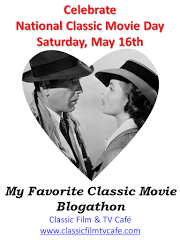In Citizen Kane, director Welles ties everything together–not just the story (he does wrap the narrative visually), but also how the filmmaking relates to the film’s content. Kane’s story can’t be told any other way. That precision–whether it’s in the summary sequences or in how scenes cut together–is absolutely necessary to not just keep the viewer engaged, but to keep them over-engaged. Even with the conclusion, where Welles reveals the film’s “solution” (quote unquote); it doesn’t resolve that mystery in a timely fashion–Welles drags it out to get the viewer thinking, questioning. Welles puts together this perfect film and then asks the viewer to wonder whether or not it was all worth it. Not just his making it, but the viewer’s watching it.
The little moments in the film–Welles gets in these subtle things with melodramatic fireworks going off in the background, whether its Dorothy Comingore’s humanity or Everett Sloane’s wistfulness or “protagonist” William Alland’s frustration–remind the viewer the story’s still about people. And why shouldn’t it be? Most scenes in Kane feature two to three working characters. Sometimes Welles has people in the background, sometimes he doesn’t. The little moments in big scenes–like one between Joseph Cotten and Sloane during a party–are often more devastating than the little scenes.
Welles unforgivingly asks a lot of the viewer. He opens the film with a complex fading sequence to bring the viewer into the world of Kane, then abruptly pulls the film out of itself, into a newsreel. And for almost twenty minutes, Welles barely gives himself any screen time. It’s always such a big deal that first time Welles lets Kane have an audible line in the newsreel.
All that control isn’t to prime the viewer, isn’t to get him or her desperately wondering about Rosebud, all that control is because the film needs it. Kane spans forty-some years in under two hours. Far under two hours if you don’t count the newsreel “first act.” When Welles establishes his character as an older man, an atypical protagonist–Kane’s infinitely sympathetic while never likable, though Welles knows his charm goes a long way in lightening a heavy scene–he does so without hostility. Nowhere in Kane does Welles play for the audience, but he also doesn’t artificially distance them. The opening does, quite literally, guide the viewer into the film.
Kane is an unsentimental film about a sentimental subject and Welles does wonders with that disconnect.
Comingore probably gives the film’s best performance. Welles is amazing and mesmerizing, but so much of the second half has to do with how he plays off her, she’s essential. Of course, there aren’t any merely good performances–even Erskine Sanford, in the closest thing to a comedy relief role, is great. Ruth Warrick, Ray Collins, Paul Stewart, George Coulouris–all fantastic.
And Joseph Cotten as the film’s “good guy?” He’s marvelous.
Impeccable Gregg Toland photography, great Bernard Herrmann music.
500 words aren’t enough.
This post is part of the My Favorite Classic Movie Blogathon hosted by Rick of Classic Film and TV Cafe.


Leave a reply to thelovenest95 Cancel reply